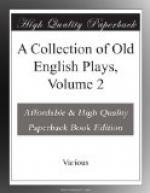The volume contains in all fifteen plays, written in various hands. One piece has the author’s initials attached, but the others have neither name nor initials.
First in order, leaves 1-29, stands Fletcher’s Elder Brother. I have compared the MS. with Dyce’s text, and find the variations to be few and unimportant. In III. 3 Dyce follows the old copies in reading:—
What a noise is in this house!
my head is broken
Within a parenthesis:
in every corner,
As if the earth were shaken
with some strange colic,
There are stirs and motions.
As the words “within a parenthesis” were found in all the old copies Dyce did not feel justified in rejecting them, although he had only the most grotesque meaning to assign to them. Theobald rightly saw that “within a parenthesis” was a marginal note, mistaken for a part of the text when the book was sent to press. The MS. gives—
Sweet heart,
What noyse is in this house?
my head is broken
In every corner, as the earth
were shaken
With some strange Collick:
there are stirs and motions:
What planet rules this house?
Whos there?
In III. 5 the MS. supports Mason’s correction “Their blue veins and blush disclose,” where Dyce followed the old reading “in blush.”—At the end of the play, after the Epilogue, are written the three following Epigrams:—
A freemans life is like a
pilgrimage:
What’s his life then
that lives in mariage?
Tis Sisyphus his toyle
that with a stone
Doth doe what surely for ease
must be done.
His labours journey’s
endles; ’tis no riddle,
Since he’s but halfe
on’s way that stands inth’ middle.
Ad Janum.
Take comfort, Janus;
never feare thy head
Which to the quick belongs,
not to the dead.
Thy wife did lye with one;
thou, being dead drunke,
Then art no Cuckold though
she bee a Punke.
Tis not the state nor soveraintie
of Jove
Could draw thy pure affections
from my love:
Nor is there any Venus
in the skyes
Could from thy lookes withdraw
my greedy eyes.




